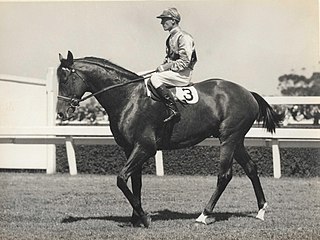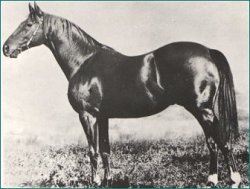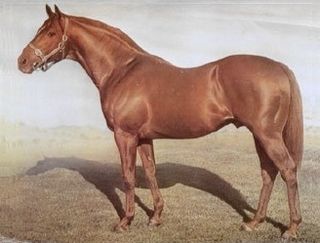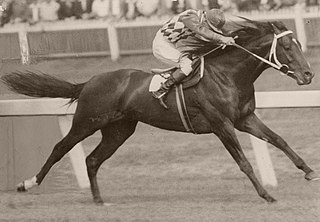
Musket (1867–1885) was an English-bred Thoroughbred racehorse and a Leading sire in Australia and New Zealand.

High Caste was a Thoroughbred racehorse and stallion that was bred in New Zealand and was considered the best two-year-old in New Zealand after winning three of his four race starts. He was a good racehorse under handicap and weight for age conditions and combined this with wins in good races from 5 furlongs to 1 3⁄4 miles (2,800 m), carrying up to 10 stone 6 pounds.

Poseidon was an Australian Thoroughbred Hall of Fame racehorse. He won 19 races over distances ranging from five furlongs to three miles. Sixteen of these wins were "Principal Races", eight of them now of Group 1 (G1) status.

Ajax was a champion Australian bred Thoroughbred racehorse and sire, who won 18 consecutive races before he was defeated at the odds of 40/1 on, causing a huge racing sensation. He had wins from 5 furlongs (1,000 metres) to 1½ miles (2,400 metres), equalled the Australasian record for a mile (1,600 metres), and created three new race records. At stud in Australia, Ajax proved to be a good sire. He was then sold as a 14-year-old horse and exported to the United States before he was later sold to Bing Crosby and Lin Howard. Ajax was inducted into the Australian Racing Hall of Fame in 2004.

Heroic (1921–1939) was an Australian Thoroughbred racehorse who won 21 races from 5 furlongs to 2 miles (3,200m) and was a leading sire in Australia.

Stockwell (1849–1870) was a British Thoroughbred racehorse and a Leading sire in Great Britain & Ireland seven times; he was second on the sires' list a further four times during a 14-year period.

Royal Gem was a versatile Thoroughbred racehorse that won 23 races ranging from 5 furlongs to 12 furlongs. He was later a successful sire in the United States.

Bay Middleton was an undefeated Thoroughbred racehorse whose victories included two British Classic Races. He was twice the Leading sire in Great Britain and Ireland.

Baguette was an Australian bred Thoroughbred racehorse that was undefeated as a two-year-old and became the first winner of the Two Year Old Triple Crown. His wins included 14 Principal Races and he retired to become a good sire.

Chester (1874–1888) was an Australian thoroughbred racehorse and a leading sire. He defeated some of the best horses in training over distances ranging from five furlongs to three miles. He was the leading sire in Australia on four occasions.

Briseis foaled in 1873, was a brown Australian Thoroughbred filly that is regarded as one of the greatest mares ever foaled in Australia. As a two-year-old she won the AJC Doncaster Handicap and the weight for age (w.f.a.) AJC All Aged Stakes. Then as a three-year-old she won the VRC Victoria Derby, the Melbourne Cup and the VRC Oaks, all within six days.

Grand Flaneur was an outstanding Australian Thoroughbred racehorse and sire, who won nine successive races, including the AJC Derby, the Victoria Derby and the Melbourne Cup, before he retired undefeated. He had won races over distances ranging from five furlongs to three miles. He was the Leading sire in Australia in 1895 and was close to the top of the list for a decade.

Choisir is an Australian-bred dual hemisphere-winning Thoroughbred racehorse. He became the first Australian-trained winner of the Group Two King's Stand Stakes. The same year, Choisir also won the Golden Jubilee Stakes and was second in the July Cup.

Manitoba (1930-1951) was a British bred Thoroughbred racehorse that was a race winner in England before he was exported to Australia where he was a leading sire.

Comic Court (1945–1973) was a most versatile post-war Australian bred Thoroughbred racehorse who set race records at distances of 6 furlongs and 2 miles. He won the 1950 Melbourne Cup carrying 9 stone 5 pounds (59 kg) and set an Australasian record of 3 minutes 19½ seconds.

Wilkes was a French Thoroughbred racehorse who became a leading sire in Australia. He had two victories, over 1,500 metres in the Prix Sans Souci at Maisons-Laffitte and the 2,000 metres Prix Edgard de la Charm at Saint-Cloud, for 1,446,200 francs in stakes.

Encosta De Lago was an Australian bred Thoroughbred racehorse that won three group races from eight starts including the Group One (G1), Vic Health Cup against older horses. He was the Leading sire in Australia during 2008 and 2009.

Tulloch (1954–1969) was a Thoroughbred racehorse, who is regarded as one of the finest racehorses in Australian racing history. He won at distances from 5 furlongs to 2 miles, established Australian records at 10 furlongs and 12 furlongs, and took 2 seconds off Phar Lap's 28-year-old record for the AJC Derby. As a three-year-old Tulloch won 14 of his 16 starts before he was struck down by a virus which kept him off the racing scene for almost two years. He returned to racing as an autumn five-year-old and won 15 of his last 24 races.
Thomas "Tom" Hales was an Australian jockey who has been called the Fred Archer of the Australian turf. During his 20-year career he rode nearly 500 winners, including every major South Australian and Victorian race with the exception of the Caulfield Cup.
James "Old Jim" Wilson was a racehorse trainer in Victoria, Australia, founder of the historic St Albans Stud in Geelong, and trainer of the 1873 Melbourne Cup winner Don Juan and 1876 winner Briseis. His older son James Wilson, Jr. captained the Geelong Football Club and as "Young Jim Wilson" trained 1899 Cup winner Merriwee, and younger son William Wilson was the jockey who rode Don Juan to victory in the 1873 Cup.


















